Moffat's Who RANKED (70-55)
- Adam Tye
- Oct 7, 2018
- 13 min read
70. Rings of Akhaten (S7E8)
Written by: Neil Cross

Hey look, it’s The Beast Below’s younger, more sparkly cousin. The Rings of Akhaten gets dunked on quite a bit for reasons that are…okay, very understandable. But underneath the schamltz-overload (even by Doctor Who standards) and the extended music sequences that tip into filler territory, this might be one of the most subtext-loaded episodes of the entire show. There’s a great theory that the episode itself is a meta-textual look at what it can feel like to write and contribute to the show as the whole (as the whole planet worships and feeds a ‘grandfather’ in a box), but even outside of that there’s quite a bit to dig into and it all leads to arguably Matt Smith’s finest moment. Smith might be the youngest actor in the role but it’s here in his final showdown against a literal God (aside: has the show’s atheistic tendencies ever been so clear?) that the Doctor truly appears his age and we see in Smith’s eyes a lifetime of a thousand years. Though it does beg the question as to why the Doctor is gifted one of his most iconic and scene-stealing speeches in an episode that is really about the companion.
69. Under the Lake (S9E3)
Written by: Toby Whithouse

I love writing about Doctor Who, as you might have noticed. But sometimes there’s just…nothing to talk about. On a related note, here's Under the Lake, of which best thing that can be said about it is that it's quality never really jumps off the deep end. The worst thing that can be said is that it’s so aggressively ‘meh’ that trying to do a deep dive into it without bringing up ‘Before the Flood’ is incredibly difficult. I've seen people straight up love this episode and that's great, but for me I can feel the gears grinding into place too loudly to get invested.
68. Time Heist (S8E5)
Written by: Stephen Thompson & Steven Moffat
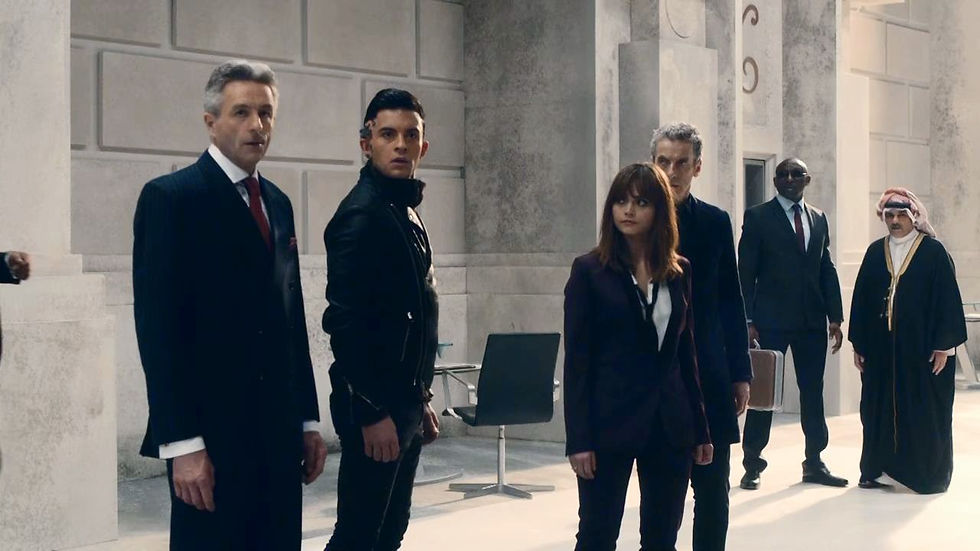
Time Heist is odd amongst Series 8 in that it feels like a leftover from the Series 7 era. That is, it's fine enough, but not particularly memorable in the long run. It's biggest sin is in thinking its emotional character work is bigger than it actually is, so you have character deaths and reunions that are presented as massive, but (and I feel like a dick for saying this) are just not good enough to earn themselves. On top of that, this is mostly just a bit of a missed opportunity for a heist episode of Doctor Who that doesn't have the time to set up its twists and reversals properly, whilst reducing its titular premise to a fairly lame twist. It does, however, have cool creature design and that scene in the vault and Keeley Hawes, so it's not all for nothing.
67. Before the Flood (S9E4)
Written by: Toby Whithouse
Mortality and the Fury of Time run throughout Series 9, but Before the Flood might be the first (and most literal) representation of that idea. Here is an episode where the Doctor's own ghostly apparition strolls around the murky depths, characters must confront the irreversible deaths of their colleagues and Capaldi explains the bootstrap paradox straight to camera whilst strumming out a guitar rendition of Beethoven's fifth (and a new distorted version of the theme tune which honestly might be the best part of the episode). Toby Whithouse grabs his somewhat basic first part and takes it for a spin with this episode and the result is definitely more interesting...if a bit try-hard. Which I wouldn't mind except that the cracks apparent in Under the Lake threaten to undo a lot of the investment we can put into the episode. The romance subplot, for instance, isn't an inherently bad storyline (and I'm getting a bit weirded out by how many people seem to hate romance subplots on principle as opposed to on execution), but the seeds just aren't planted at all and so, as a result, the big emotional question of the episode and overall series (is the Doctor devaluing the lives of others in order to look out for Clara?) kind of thuds into place instead of clicking. Don't get me wrong, there's way more meat on the bones here than in part one and the Fisher King is a fantastic bit of monster design, but it lies on rocky foundations and that ground can't help but give way just a little bit by the end.
66. The Zygon Invasion (S9E7)
Written by: Peter Harness
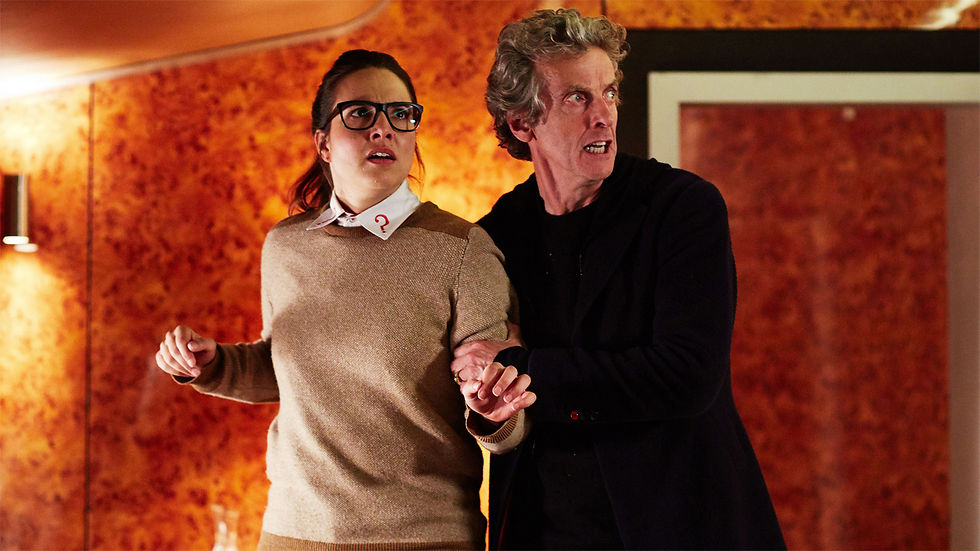
Okay so this might be the first controversial position on the list. The Series 9 Zygon two-parter gets a lot of acclaim for its political 'subtext' (it's basically just straight up text) and that's definitely applaudable (and handled infinitely better in the follow up), but for me there's always been this weird disconnect between a super-serious story about war and...the Zygons, who always struck me as kind of goofy. The Zygon Invasion doesn't even try to adapt the Zygons to fit them better into the tone, but instead sticks them wholesale in the middle of what is arguably the most serious story in the history of the show. The result is bizarre, with some striking imagery (Ozgood's forced video) and genuinely emotional scenarios (the soldiers are led inside the church) beset by big rubbery Zygons. This probably isn't a popular opinion amongst the Doctor Who fanbase, but hey, it's mine. Also the writing just seems a bit less thought out at times, with even moments I enjoy (the aforementioned soldier scene, the Doctor boarding the plane) falling to bits as soon as you consider them for more than a minute.
65. Dinosaurs on a Spaceship (S7E2)
Written by: Chris Chibnall

Right, yeah, I know, this has come higher than the Zygon Invasion. By a lot of standards, this is not a great episode. It even contains the same narrative transparency that was in Chibnall's Silurian two-parter, if not to an even worse extent. I mean, what an astonishing coincidence that every member of the spontaneous gang ends up being useful for the finale (my favourite is the twin driving chair thingies needing a biological match to operate and oh what's that here comes Rory and his Dad well phew CRISIS AVERTED I GUESS). Buuuuuut whereas the Silurian two-parter was bereft of vitality or...anything interesting...Dinosaurs on a Spaceship actually has some pizzaz and imagination behind it. It's probably true that core premise is a bit too 'lolz randem' to rise above ridicule, but the macro invention on display is actually pretty cool - particularly the return to Bad Wold bay, which this time functions as an enormous tidal engine room. Yes, the robots suck. Yes, the Doctor's decision to leave Solomon to die is under-examined to be warranted as a violation of the Doctor's character. Yes, this episode is, realistically, no good. But I have fun with it and apparently that's good enough at this point in the ranking.
64. The Pilot (S10E1)
Written by: Steven Moffat

Moffat's greatest appeal in Doctor Who has tended to be his exhilarating approach to ideas and how he will latch on to a core concept and race it hurtling into the sun far beyond where other writers would push the material. That's not just in terms of sheer logistics, but in terms of how far that freewheeling will take the characters out of their comfort zone. Which is what makes The Pilot such a damp squib of an episode in comparison to the rest of his work, because it features basically none of that. I'm not sure why Moffat self-imposed the limitation of writing a new entry point for the show, given how he knew this was his last Season (plus he kind of gives up on that eventually, anyway), but it results in this really cramped piece of storytelling that focuses pretty admirably on the companion at the expense of everything else. The Doctor is apparently in the middle of a system reset here, with most of the previous character work temporally backgrounded and then when the threat actually decides to do something way too late into the episode, everything flies by too quickly to make an impression. In fact, I'm calling it now that this episode contains is the single worst use of a Dalek ever, as it shows up to scream none discriminately before getting its ass handed to it by a puddle.
Also, if I can make a confession: I don't really like Bill all that much for the first few episodes of Series 10. Whilst a lot of her arc is handled sensitively and she really finds her footing as we approach the Series mid-point, some of the lines dished out here are weirdly awkward considering Moffat's general skill with dialogue ("I hate my face, it's always doing expressions when I'm trying to be enigmatic."). So when the episode jettisons everything else to focus entirely on her, it's a risk that doesn't pay off for me, even though I understand that to not do it would have been weird.
63. Smile (S10E2)
Written by: Frank Cottrell-Boyce

It's kind of weird that it took Doctor Who ten seasons to do a two-hander but here we are at last. The results are...interesting? Honestly the best compliment I can give Smile is that it has a lot on its mind, particularly regarding optimism which Doctor Who has sort of built its legacy on. The whole idea of optimism being an innately human construct and that when it's applied to cold robotic brains like those of the Vardy it becomes unsustainable, is not just a cool talking point but one that pokes right at the very soul of the show itself. The problem is that you'd never know those kind of stakes were on the table from the episode itself. We get such grim material as Soylent Green fertiliser, grief transformed into plague and a vision of humanity decimated and scattered throughout the stars and yet it doesn't really matter in the end. Bill tootles off back to the TARDIS and we can file all that unpleasantness under the 'easing the companion in gently' category of episodes. Which is bonkers. Plus we get more weird writing for Bill, such as her immediately understanding the Doctor's obfuscated solution at the end of the episode or some more dialogue that really clanks off the tongue ("...You know, blow something up...get into trouble; that's like a standard sequence.")
62. The Empress of Mars (S10E9)
Written by Mark Gatiss

Empress of Mars is the work of a Doctor Who fanboy that is pretty sure he will never get to write for the program ever again and so throws every bit of nerdy indulgence he possibly can at the screen while he still has the chance. It's remarkable, given that description, that the episode never feels particularly fan-wanky and when it does threaten to tip over into that territory (Alpha Centauri showing up in the most bafflingly niche reference Doctor Who has dared throw at its Saturday night audience) you can't really get mad at it for doing so.
It's just that, outside of that admirability, I'm not sure what else there is to get excited about here. The Ice Warriors are back, which precisely three people asked for. The Doctor tries to bridge the gap between two warring factions, but ultimately doesn't have all that much effect on the process (the show would actually handle this sort of conflict much more meaningfully in the very next episode). Perhaps most tellingly; the best part of the episode ends up being the continuation of the Missy plotline from the week before and it has absolutely nothing to do with the Ice Warriors, Empresses or Mars. People ask for Doctor Who to be more standalone, but honestly it's episodes like this that make me wonder why that is, given that at the time we were all just waiting for things to get back to the story-arc.
61. Oxygen (S10E5)
Written by Jamie Mathieson

Is Oxygen actually really good, or is it not that hot? I ask largely because no-one can seem to agree. The line seems split between those who think its really great and those that don't think of it at all. I probably fall in the latter camp but that's not to say the episode is bad. It definitely holds your attention and outside of the Zygon two-parter, this is probably the most brazenly political episode of the entire show (Doctor Who vs Capitalism). It's just that those compliments for me work more as broad brush strokes instead of actually parsing out the episode piece-by-piece. Which is an awkward way of saying that Oxygen is kind of empty - the true reduction of Doctor Who into corridor-running mode with red shirts to spare. Even the Doctor going blind doesn't actually have much of an impact on how things pan out (at least, not until the next episode) and the moment Bill 'dies' we're all just waiting for her to come back because the episode (and Season 10, to be fair) hasn't yet sold us properly on the idea of narrative consequence. Plus, the supporting cast might as well not have showed up for all the impact they have.
Oxygen on the whole is okay, but its hard to really feel like there's a lot to chew into at the end of it all.
60. Cold War (S7E9)
Written by Mark Gatiss
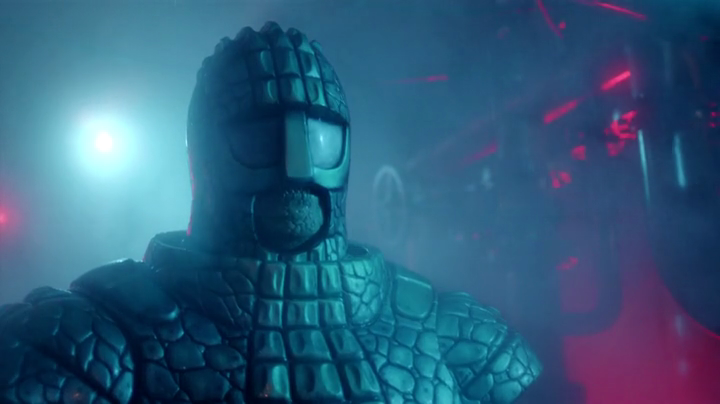
An almost carbon-copy of 'Dalek' written by Mark Gatiss starring the Ice Warriors isn't exactly an episode description that gets peoples enthusiasm glands firing, and sure enough that was how I felt when this episode originally aired. In practice it fits right into Series 7's disposability problem wherein every episode just sort of happens and then fizzles into thin air as soon as the credits roll and so it took me about four years to actually return to it. When I did, I was actually pleasantly surprised. I mean, I'm not going to pretend that the episode is sublime or particularly meaningful but the actual momentum on display here is kind of solid. That's then bolstered by some stellar direction that really leans into the Alien-esque tension of the setting whilst mixing things up with a really odd green and pink colour palette. Cold War might just be another base-under-siege episode like Oxygen, but at least its actually kind of tense.
59. Journey to the Centre of the TARDIS (S7E11)
Written by Stephen Thompson
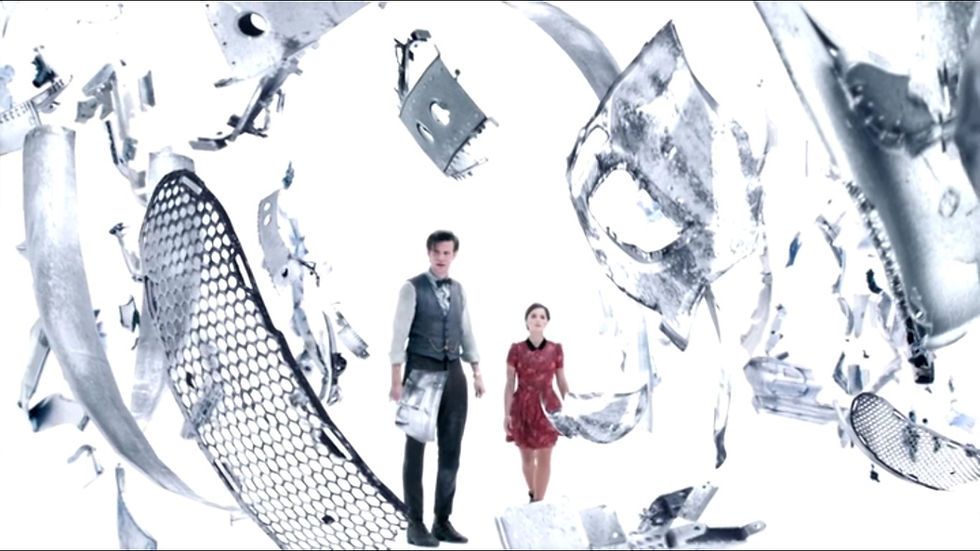
Okay, so it was probably never possible for an episode to live up to a title as salacious as this one, but you could at least come close. JTTCOTT (fuck me) has this weird distinction of being an absolutely killer premise with some actually cool scenes in it, whilst simultaneously being the most forgettable episode of Doctor Who ever made. As in I literally forget that it exists most of the time. I kind of can't get my head around that given how goddamn bananas a lot of this episode is but I'm pretty sure it has to do with the Van Baalen brothers, who I feel little to no shame in calling the worst guest cast in all of Nu-Who. It's not even that they're uninteresting, but (and I realise this sounds harsh) the performances just aren't their at all. The rhythm of conversation is weird and the attempts to humanise any of them are pretty weak, to the point where I think the Doctor actually goes pretty fucking easy on them with the whole 'fake countdown' bit. This is also the episode that literally presses the reset button at the end and tries to be self-aware about it, which doesn't make up for the fact that the preceding 40 minutes feel like an epic waste of time that tell us virtually nothing about any of the characters.
Having said that, there is some cool stuff to be had here regarding the interior of the TARDIS that the inner fanboy in me finds hard to resist. The budget limitation is obvious and annoying but scenes like the library are cool to see finally realised on-screen, even if it essentially amounts to a visualisation of a Doctor Who wiki article.
58. Hide (S7E10)
Written by Neil Cross

"Doctor Who can't do haunted house episodes" is what I said in part one of this ranking. To be fair, that's probably not true and Hide is at the very least the show's most solid effort in this territory. Some of the scares get kind of muted by the overt goofiness of the Doctor and Clara ("GHOSTBUSTERS" is the wit equivalent of a mallet), but there's some actually interesting twists on the formula being experimented with here. The repurposing of the ghost as a pocket universe survivor is a cool idea in and of itself, but its the funnelling of that idea through the actually pretty good supporting cast that makes the episode come alive. Of course Hide ends up being a love story all along, but its one taking place in a playground full of different universes, monsters and the ability to glimpse the span of the universe in a matter of minutes. I think it lacks the punch to really stand tall amongst the pack, but there's a pleasant amount of content whirling around in this episode and a welcome spin on a story that could have ended up being predictable in different hands.
57. The Caretaker (S8E6)
Written by Gareth Roberts & Steven Moffat

So after Closing Time, Roberts' sitcom shtick had kind of wore out its welcome (some people might argue it wore itself out before then, but I digress) and so by the time The Caretaker rolls around most people kind of dismissed it as lame and fluffy. I get that impulse, but I actually think this episode has more to offer than people give it credit for. Beyond advancing the story between the three leads, The Caretaker is one of the few episodes of the Moffat era that just lets everyone interact in their earthbound modern day setting and the result feels like it could've been ripped right from the Davies' era of the show. It fudges a couple of things - the Blitzkrieg Boxer or whatever its called isn't exactly going to win any awards in the future and Danny's backflip is just straight up silly, but as far as low-intensity Who goes, this one's not too bad.
56. The Lodger (S5E11)
Written by Gareth Roberts
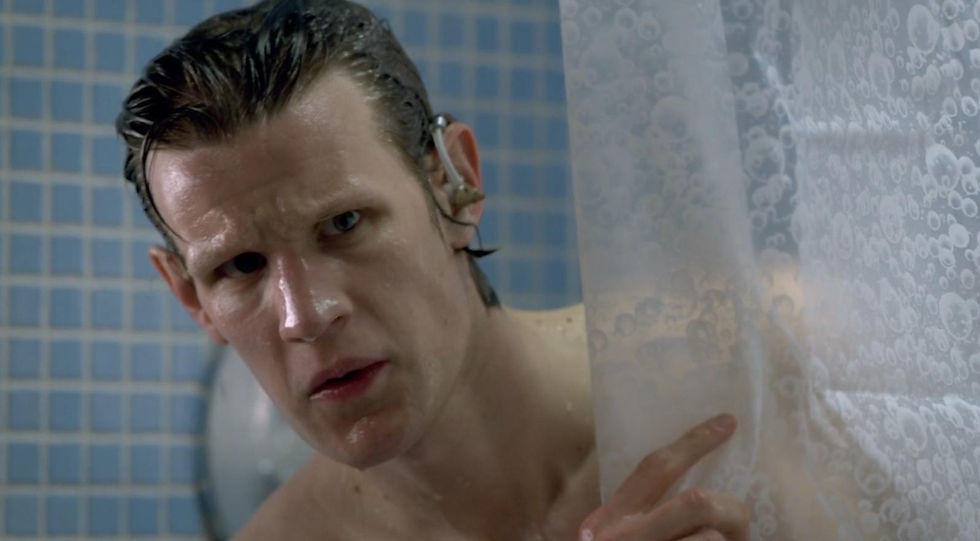
Maybe it makes sense for this to come just next to The Caretaker in the ranking. The Lodger gets an absolute barrel-load of hate from a fairly large subset of fans that I struggle to really combat. It's pretty dumb, the soapy love story feels out of place amongst the new direction of the show and it has James Corden in it. Which is why I usually stay quiet about how I actually kind of like it, for no other reason than that I find if pretty funny. I know comedy is subjective and others may hate it and blah blah blah but really all that is preface to the fact that I shouldn't have to defend myself laughing at Matt Smith wielding an electric toothbrush or upending a call centre with his insistence that the caller wait because he has to eat a biscuit. Yes it's silly. No I don't care.
55. The Crimson Horror (S7E12)
Written by Mark Gatiss
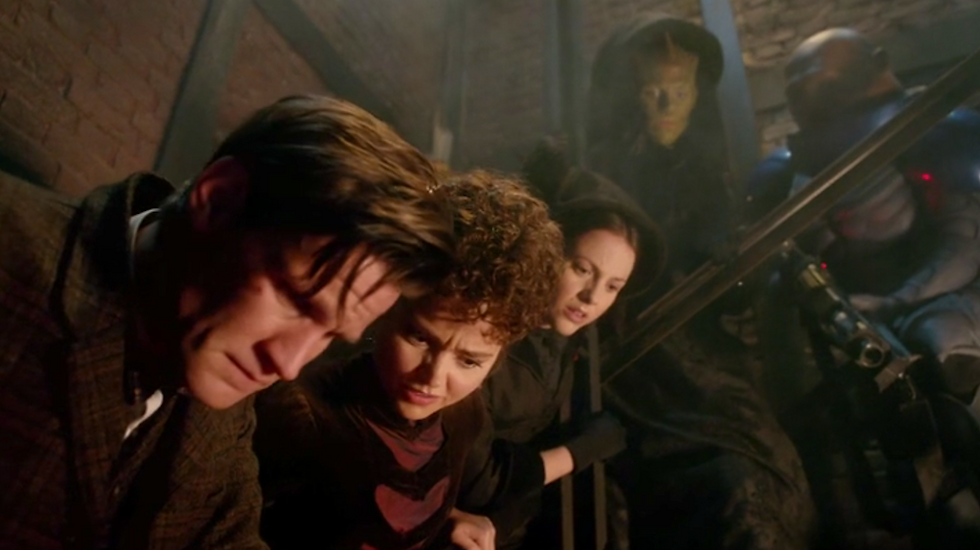
No I don't think the Paternoster gang should have had their own spin-off, or even returned to the show following Deep Breath. By this point we've seen enough of them without much development to conclude that they're fairly basic characters; for better and for worse, and so giving them their own show would probably be awful. Giving them their due, however, is okay by me and so we have The Crimson Horror, which in some respects is one of Gatiss' strongest efforts. It's pretty much gothic camp ahoy for most of the episode, but it's focused and gives us an opportunity to see a different side to this world that we otherwise only glimpse - namely, what it looks like to tackle Victorian London as a ragtag gang that happens to contain a lizard and a potato.
Then the Doctor arrives and the whole episode's focus is vacuumed out of an airlock. So close.
Kind of a frankenstein mish-mash of episodes here ranging between the dull and the dumb, with Series 7B hogging most of the spotlight which honestly doesn't surprise me. I think the commonality to all the episodes discussed here is that they ring a little hollow, but we're moving pretty far away now from the cringe-inducement of Knock Knock (I watched it again last night and hoo boy is it rough) and into the territory where we get some actually solid hits, which will probably energise me to write about them a lot quicker than this batch (though no promises).






Comments